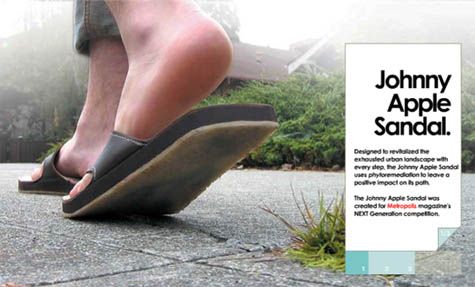- An unrepentant Harrington [the farmer in question] said he had resorted to the secret planting after the Welsh assembly, which voted unanimously for GM-free status in 2000, refused to have any meaningful discussions over its policy. He said: "Out of frustration I went and bought some varieties of maize bred to be resistant to a pest called the European corn borer and which are grown widely in Spain, France, Germany and the Czech Republic."
The varieties he chose were on the EU common variety list, and as such it is legal to grow them anywhere in Europe.
 [Image: "Johnny Apple Sandal" by Lift].
[Image: "Johnny Apple Sandal" by Lift].Briefly, I'm reminded of a design project from nearly half a decade ago called "Johnny Apple Sandal," where the soles of a pair of sandals had different varieties of wildflower seeds embedded in their plastic; as your soles wore down, the seeds were released – theoretically going on to form new landscapes. A kind of pedestrian agronomy.
But what a perfect tool for agricultural smuggling! You load up your sandals with genetically modified seeds, fly to Wales, and go for a long hikes in the Brecon Beacons. Soon enough, you've contaminated the hills with illegal plants, or forms of life subject to government regulation.
In any case, I also can't imagine that this is the only example of such a thing; this farmer just seems like the only one who was caught. It's not hard to speculate that there are what might be called – with no small amount of irony – protest gardens full of genetically modified plants sprouting in secret across the world.
What strange cultivations might we yet stumble upon in some unofficial garden in the woods?
(Thanks, Alex, for the Welsh farmer article!)
No comments:
Post a Comment